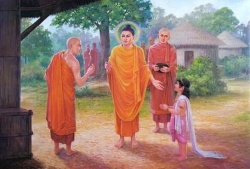Aniruddha
- It can also refer to Aniruddha (21st Shambhala King)
Aniruddha (P. Anuruddha; T. Ma ’gags pa; C. Analü; J. Anaritsu; K. Anayul 阿那律). One of the ten great disciples of the Buddha, who was Gautama’s first cousin and brother of Mahānāman. Along with many others of the Buddha’s relatives in the Śākya
clan, such as Ānanda and Devadatta, Aniruddha renounced the life of a householder to become a disciple of the Buddha when the Buddha returned to his home town of Kapilavastu after his enlightenment. According to legend, Aniruddha was once scolded by the
Buddha for sleeping too much. Aniruddha subsequently devoted himself to vigorous practice without sleep (see Dhutaṅga), as a consequence of which he became blind. The Pāli Theragāthā notes that he did not sleep at all for twenty-five years, and that for the last thirty years of his
life, he slept only during the last watch of the night. Despite his physical blindness, he attained through his meditative practice the divine eye (Divyacakṣus) and came to be ranked as foremost among the Buddha’s disciples in that attainment. For this reason, in
East Asia, he is given the epithet Tianyan Diyi or “First of Those Who Have the Divine Eye.” According to Pāli tradition, after the recitation of the Buddha’s teachings at the first Buddhist council (Council, First), Aniruddha and his disciples were entrusted
with preserving the Aṅguttaranikāya. Aniruddha and the Buddha held one another in particularly high regard, and many of the Buddha’s discourses were addressed personally to him. In assemblies, Aniruddha always sat near the Buddha, and he was present at the Buddha’s
death. He consoled his fellow monks at their master’s passing (Parinirvāṇa) and advised the Mallā on how properly to carry out the funerary rites.
ANIRUDDHA (Tib. Mah hgags explained by not poor, and by not extinguished. Name of a disciple of Sakyamuni, who being himself ' not poor', supported, during a famine, many Pratyeka Buddhas, which charitable act caused among the devas a joy which is, to the present day, 'not extinguished.' He is to reappear on earth as Buddha Samantapmbhasa.
See also Anuruddha.
Source
The Princeton Dictionary of Buddhism by Robert E. Buswell Jr. and Donald S. Lopez Jr.
Aniruddha (阿那律) became a disciple soon after the Buddha’s enlightenment. He used to fall asleep when the Buddha was teaching and was reproved by the Buddha. Ashamed, he practiced day and night without sleep and lost his eyesight. However, he was able to see with his god-eye.
Source
阿那律 (Skt; Pali Anuruddha; Jpn Anaritsu)
A cousin of Shakyamuni Buddha and one of his ten major disciples. Either Amritodana or Dronodana is regarded as his father, each of whom was a younger brother of King Shuddhodana, the father of Shakyamuni. Aniruddha is known as foremost in divine insight among the Buddha's disciples. According to the Increasing by One Agama Sutra, he once fell asleep while the Buddha was preaching at Jetavana Monastery in Shravasti, the capital of the Kosala kingdom, and was severely reprimanded. He vowed never to sleep in front of the Buddha. From that night on he did not sleep at all, and this damaged his eyesight. Shakyamuni admonished him to sleep, but he never broke his vow. He eventually went blind as a consequence of sleep deprivation, but simultaneously obtained divine insight, or extraordinary powers of discernment. The "Five Hundred Disciples" (eighth) chapter of the Lotus Sutra predicts that he will become a Buddha named Universal Brightness.
Source
Aniruddha (Skt.) — a cousin of Buddha Shakyamuni who became one of his principle disciples.
Further Reading
- Nyanaponika Thera, The Great Disciples of the Buddha: Their Lives, Their Works, Their Legacy (Wisdom Publications, 2003).
